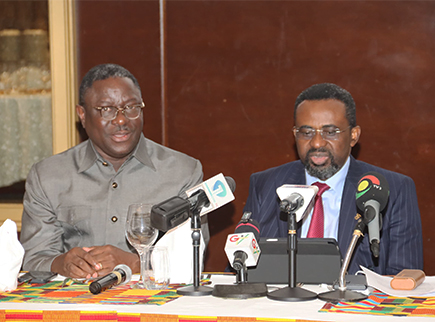The Governor of the Bank of Ghana, Dr Johnson Asiama, has called for a regular meeting with members of the Association of Ghana Industries to help sharpen policies to drive economic growth.
“We need to get feedback on what we are doing. With those feedbacks we can sharpen our policies going forward,” he said at a meeting with AGI members.
“The AGI Corporate Forum represents exactly the kind of data-driven, solutions-focused dialogue that we need to unlock greater flows of sustainable capital and private investment,” he added.
The meeting provided an opportunity to engage in meaningful conversation on how policy and enterprise can align more effectively to sustain growth, ensure stability and create shared prospects.
It also allowed the Governor to provide insights on the economic outlook and policy direction that will guide industry through the next phase of Ghana’s economic journey.
Dr Asiama said the country’s economic recovery was still unfolding, ‘but one thing is clear, that we are back on a
credible path.’
“We are laying the foundations for an economy, an economy that is not just recovering, but an economy that is rising with purpose,” he said.
“In global finance, the most valuable currency isn’t always printed on paper or stored in vaults. It’s the trust of people who wake up every morning, every morning to run their businesses, every morning to make payroll, and every morning to take risks. That’s what we are working to earn and protect in this country,” he said.
“It is earned through consistency, it is earned through transparency, and it is earned through a reform-minded leadership, all of which we are committed to deliver,” he added.

Dr Asiama said the appreciation of the cedi in recent months was a signal of confidence and reflected improvements across the board, including a gradual easing of inflation, tight monetary policy stance, ongoing fiscal consolidation and reserve accumulation.
“At the Bank of Ghana, our goal is not to manage exchange rates; we’re not targeting the rate, but to create a policy environment where market stability can take root.
But we are under no illusions. Stabilization is only the beginning. The real challenge is how we sustain confidence,
how we mobilize long-term investment, and how we finance our development without backsliding,” Dr Asiama said.
He said as the country moved forward with reforms in financial intermediation, public sector efficiency, and the investment climate, industry leaders must come on board partner to shape Ghana’s next chapter.
On monetary policy, he said the Committee voted unanimously to maintain the policy rate at 28 per cent, reflecting continued commitment to consolidate the inflation gains achieved in recent months and anchoring inflation expectations.
Dr Asiama said the Bank of Ghana fully recognized that the elevated rate posed challenges, particularly for industrial working capital and operational financing.
“The high interest rates are not ideal for businesses, businesses that are trying to expand, to restock, or to invest. But this is not a permanent state of affairs. It can be turned around. So our objective is clear, to bring inflation down decisively so that we can create the conditions for stable and sustained reductions in lending rates,” he said.
He said price stability was the foundation for affordable credits, long-term planning, and real investment, adding that his vision was to see lending rates move toward 10 per cent over the medium term once inflation was durably on the downward path and expectations were fully anchored.
He said the Bank was also enhancing its liquidity management through a shift from the passive cash reserve ratio to a more dynamic open market operations framework, improving precision and flexibility in implementing monetary policy.
“We understand the pressure businesses face, but a choice before us is clear. Stay the course and deliver sustainable stability or retreat too early and risk losing everything we have gained,” he said.
“We are choosing this discipline today so that industry can thrive tomorrow in a low-inflation, low-interest-rate environment that rewards productivity and not speculation. Stability is necessary to partner industry, but not sufficient. What we seek is transformation, and that can only happen through close collaboration with the private sector,” Dr Asiama added.
Dr Humprey Ayim-Darke, President of AGI, said private sector and businesses played a significant role in the economy’s growth and development.
He said the meeting was at a time when the economy was showing signs of resilience and recovery.
“Recent macro-economic indicators including declining inflation, stabilizing exchange rates and renewed confidence in the economy reflect positive trajectory that gives us all reason for a cautious optimism,” Dr Ayim-Darke said.
“These gains have and must be consolidated and translated into real tangible benefits for businesses, workers and households,” he added.
